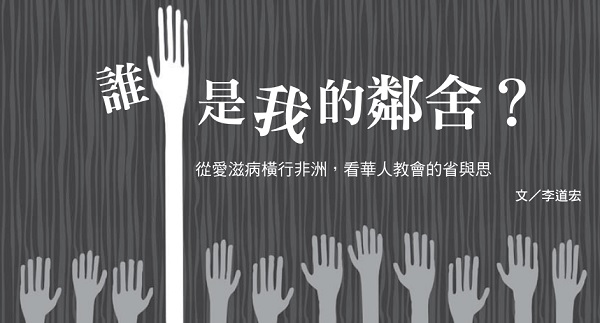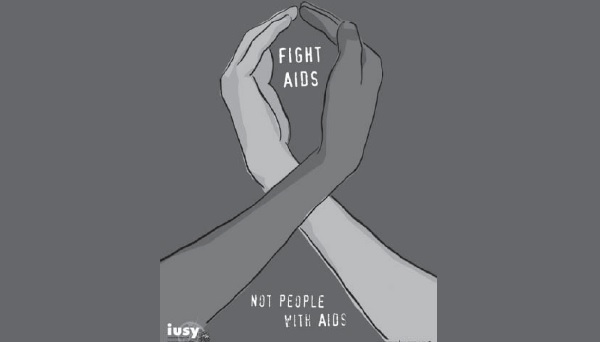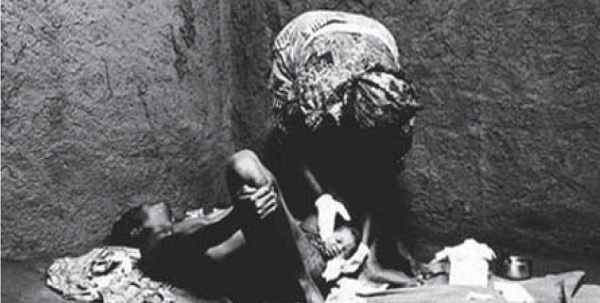Who is my neighbor?
Looking at the reflections and reflections of the Chinese church from the perspective of AIDS spreading across Africa

Africa is the continent with the most AIDS epidemic in the world. Today, between 20% and 40% adults have AIDS or are infected with HIV in many countries south of the Sahara and East Africa. This problem is just the tip of the iceberg in a land of many sufferings. There are also poverty, malaria and war that make the people here very far away from a happy life.
According to statistics from the World Health Organization (WHO) in 2007, 22.5 million people in Africa are infected with AIDS, and there are approximately 1.7 million new infections every year. Sadly, many traditional African missionaries of the past viewed AIDS as a "curse from God." They condemned AIDS patients as sinners and refused to hold funerals for believers who died of AIDS.

▲December 1st is World AIDS Day, a wake-up call for the world to fight against the ravages of AIDS rather than against those suffering from AIDS.
(Taken from http://s31.photobucket.com/albums/c351/ton-amie/?action=view¤t=aids_front_big.gif)
We can no longer remain indifferent!
While the AIDS virus is ravaging this continent and spreading around the world, another more terrifying virus has also begun to spread gradually in the Chinese church, and that is the "indifferent" spiritual virus. What is even more frightening is that this silent condemnation inhibits believers from caring about and participating in effective AIDS prevention actions. The church's indifference contributes to the stigmatization of AIDS patients and carriers.
Christianity has great influence in Africa, and in many places, residents even claim to belong to a certain church. In Africa, 40% medical institutions are run by churches. Many AIDS victims are Christians and live in areas where missionaries are most active. The achievements of missionaries and churches over the past two hundred years are rapidly being swallowed up by the HIV virus. Just like the rural areas of Henan, China, it is the area with the most severe AIDS infection. It is also the province where missionaries served the hardest and had many churches in the past.
"The church can't do anything!" Many Chinese believers carry this fatalism and believe that HIV infection is a serious social and economic problem that no government, wealthy country or foundation can solve.
"If those people are Christians who follow God, they shouldn't get AIDS!" Some people have muttered in their hearts, but they don't know that many innocent cases are caused by the fact that married women cannot refuse sexual intercourse with their infected husbands, and their newly developed vaginas Girls were raped and babies were infected from their mothers.
For Chinese believers, we really need to reflect on the theological fallacy of excessive dichotomy between spirit and body, let alone a service mentality of giving lip service but not doing it personally. God calls us to "go and make disciples of all nations." How can we exclude people's physical needs? Why do we hesitate to move forward when we encounter AIDS? It is true that the Chinese church needs a missionary strategy that cares about the whole person.
Is it an empty shell or a shelter?
A lawyer stood up and tested Jesus, saying, "Teacher, what must I do to inherit eternal life?"
Jesus said to him, "What is written in the law? How do you read it?"
He answered, "You shall love the Lord your God with all your heart, with all your soul, with all your strength, and with all your mind; and you shall love your neighbor as yourself." (Luke 10:25-27)
During the genocide in Rwanda, many churches closed their doors and were unwilling to receive refugees seeking asylum and shelter, covering their ears and ignoring their pleadings. As things have changed, people in society have become disappointed, indignant, and even contemptuous of the church's performance in this tragedy, accusing those churches of being empty shells with only appearance.
The witness and credibility of the church today come from how it responds to social challenges and crises. Yes, we must ask ourselves: “Who is our neighbor?” When we evangelicals loudly emphasize the spiritual dimension and even ridicule social evangelicals for being too worldly, have we forgotten that the eternal life Christ offers is not just hope? Does the happiness we gain in the next life also enable us to gain abundant life in this life?
In Africa, Christian churches, including the Catholic Church, have gained the trust of local people and have become reliable community resources and educational institutions. Church hospitals also have a long history and contributions. Therefore, the church has more opportunities to reach the people than any institution. With its solid infrastructure and systematic organizational management, there are church buildings in every corner of the country, no matter how remote, as a stronghold for AIDS education and ministry. Co-workers, not only pastors, but lay people also have considerable positions in the community and can serve effectively.
AIDS is a chronic disease. With the widespread use of drugs that extend the lives of infected people, we are facing another major challenge, which is to provide treatment for AIDS patients. In recent years, many African countries have been very effective in this regard, which also means that the church has been serving AIDS patients for a longer period of time.

▲In the hospice hospital in Zambia, a nun helps Kevin, a thirty-year-old AIDS patient, take a bath; even simple daily activities are a painful challenge for him. (Taken from www.usnews.com)
Imitate the Incarnation of Jesus
How should God’s children deal with this century-old disease that is like wildfire? The healing of the Lord Jesus is comprehensive care of body, mind and soul. He is never afraid of contacting those Han patients (commonly known as leprosy patients) who are cast aside by society. In fact, the Lord always healed them with His own touch (see Matthew 8:1-3). Let us get up and move! If you still want to ask, what can the Chinese church do? It is better to learn from the tenderness and compassion of our benefactor, so that people dying of AIDS can have the strength and dignity to face the ugly marks left on them by the cold world.
church needsBalanced information and teaching:God is love, and He is rich in mercy and kindness. AIDS is not God's punishment for promiscuity (or any kind of sin); however, the disease is often the result of promiscuity and having too many sexual partners. While caring for patients, we must also condemn and curb sexual crimes such as homosexuality and extramarital affairs. Although the Catholic Church strives to promote abstinence and fidelity to one's spouse, and does not agree with the use of condoms to prevent the spread of AIDS, most international relief agencies are unwilling to provide funding to the church, but the Chinese church cannot avoid it and not go to the church. Addressing the root cause of AIDS.

▲In a small village in southern Malawi, little Moxi was born in a mud hut. In Africa, the joy of motherhood is often accompanied by the worry of her children contracting AIDS. (Taken from www.usnews.com)
Many people lack commitment and fidelity to marriage. The church must affirm that "sex" is a holy gift from God, and marriage is a sacred covenant established by God. However, our persistence should not marginalize us in society and be attacked as legalistic or unloving. The church should not preach or condemn, but should help people know how to avoid and reject sexual behaviors that endanger life.
The church mustFull acceptance of patients:Evangelize the infected as you would to other healthy people, while helping believers see themselves as people whom the Lord Jesus loves and accepts. Teach believers to stop stigmatizing and discriminating against AIDS patients and not to add trauma and damage to suffering people. In addition, the church should also take the initiative to visit and comfort the sick, pray for the sick, baptize and share the Holy Communion.
AIDS is only one of the social ills, and the Church must stand up against other forms of social evils, such as poverty, oppression, exploitation of women and children, alcoholism, drug abuse, corruption, etc. The salvation of Christ is the hope of all people, and the church should be the source of hope for society and those who are injured, helpless, and vulnerable.
These words may be a bit harsh. I just hope that we can kneel down before the Lord, be soft-hearted, open to God, and see the vision that the Lord Jesus desires for us to touch and help those in need.
"Those AIDS patients in Africa are far away, 'out of sight, out of mind.'" I hope this is not an excuse for Christians to avoid caring.
Instead, may we follow the insight of Christian apologist Ravi Zacharias: “If the Church of Jesus Christ is willing to rise up to face the challenge of AIDS, it will be the greatest apologetic act the world has ever seen!”

▲At dawn, Shefnino Banda and hundreds of other gravediggers started working in the cemetery in Lusaka, the capital of Zambia. Every 15 to 20 minutes, funeral processions arrive. Of the 52 people buried that day, many died of AIDS, 43 of whom were between the ages of 19 and 50. (Taken from www.usnews.com)
Basic knowledge about AIDS (AIDS, AIDS)
Also known as Acquired Immunodeficiency Syndrome, this disease will destroy the human immune system and cause humans to lose the ability to resist diseases, causing viruses, protozoa, bacteria, molds, etc. to easily invade the human body and cause various diseases and occurrences. Malignant tumors can eventually lead to the loss of precious lives due to all kinds of diseases.
Virus culprit:
HIV, the full name is Human Immunodeficiency Virus. Currently it can be divided into two types, HIV-I and HIV-2. HIV-1 is the leading cause of AIDS worldwide. HIV-2 is mainly found in West Africa.
‧Window period: After being infected with HIV, it takes a period of time for the blood to produce antibodies. Therefore, in the early stage, the test result may be negative because the antibodies have not yet been produced. This is the window period. The window period is approximately 6-12 weeks after infection with the virus. During this period, the amount of virus in the patient's body is the highest and the infection is highly contagious.
‧Incubation period: The period from HIV infection to onset of AIDS can range from just a few months to more than ten years.
‧Routes of infection
1. Sexually transmitted infection: oral, anal, vaginal, etc. sexual intercourse with a person infected with HIV.
2. Blood infection:
Transfusion or contact with HIV-contaminated blood or blood preparations.
Sharing injection needles and syringes with drug-addicted infected persons.
Receiving organs from HIV-infected persons.
3. Mother-to-child vertical infection: During pregnancy, childbirth, or breastfeeding, the baby can also be infected with the mother's virus from the placenta and milk.
‧Unnecessary panic: Kissing, mosquito bites, sneezing, and coughing will not spread AIDS. In daily life, holding hands, hugging, sharing meals, sharing toilets, swimming, attending classes, etc. will not cause infection. HIV does not invade the body through the skin.
Reference: www.hs.ntnu.edu.tw/~citizen/student/1170-3.pps
 Author profile:
Author profile:
Pastor Li Daohong, who practiced medicine for nearly twenty years and then preached full-time, once pastored the Northwest Chinese Baptist Church in Phoenix. Develop online Christian mission and "Pray for China" ministry. He is currently the person in charge of the "Second Generation Missions" of the Chinese Evangelical Association (Chinese Evangelical Association). Special responsibilities for column writing, postmodern church growth, AIDS care, and missions. Author of two series: "The Second Generation Who Loves the Lord" and "40 Days of Prayer", "Pastor, I Understand You", and "Everyday Is Love - 100 Days of Praying for My Husband". Married for twenty-seven years, they have four children.
